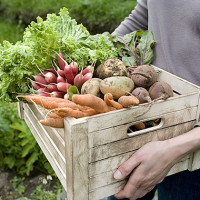Linda Castrone
Special to the Sun
When Robert and PJ Rex decided to move Deerfield Ranch Winery out of their garage and into its own Highway 12 home, they had no idea how hard that would be.
Four years and several million dollars later, the wine caves, tasting room and natural wetlands on their Kenwood parcel will soon be open to the public. The final step – construction of a 15,000-square-foot hospitality center and winery on the hillside above – is expected to begin this spring.
Robert Rex had been making the rich zinfandels, cabernets and merlots at his home for more than 20 years when he heard about 47 acres of grazing land that was for sale between the Kenwood Restaurant and Wildwood Farm Nursery. The parcel had a quarter-mile of highway frontage and climbed up and over the ridgeline toward the Rexes’ property on Warm Springs Road.
The couple bought it the same weekend they saw it, planted seven acres of biodynamically farmed vines and started working to obtain the necessary permits.
Robert’s brother Michael Rex, an architect in Sausalito, designed a winery that resembles the National Parks lodges from the 1950s, and work began on the first phases of the project. A 5,000-square-foot crush pad facility was built, followed by 23,000 square feet of wine caves with a large subterranean Grand Room in the center.
The Rexes designed a bioreactor that cleans wastewater from the winery and returns it to the vineyards as irrigation water, and found a way to trap rainwater in a recharging pond so it can percolate back into the aquifer.
And because the property also contains the last remnant of the Kenwood Marsh that once covered the Sonoma Valley, they partnered with the U.S. Fish and Wildlife Service to preserve the wetlands and an endangered herb called the Kenwood Marsh Checkerbloom that lives in only one other location.
“It’s important to maintain what you’ve got,” said Martin Rex, Deerfield Ranch’s general manager.
The tasting room permit took two years to obtain; organic certification took one year. Building the final piece of infrastructure – a turn lane on Highway 12 for traffic going into and out of the winery – turned out to be the most troublesome.
Deerfield Ranch was responsible for financing the lane, a project estimated to cost $250,000; the California Department of Transportation was in charge of building it. Due to weather delays, variances and unanticipated relocation of the unmarked gas and phone lines, costs grew to $1.7 million and delayed the winery’s opening by two years.
With that final stage completed, Martin Rex would rather focus on the future than the obstacles. “We still think it has all been worthwhile,” he said, “but there were a lot of other places that money could have gone. Because of the time it took to move through the bureaucracy, that money is lost.”
Meanwhile, business has continued as usual over the years, with grapes getting crushed, wines bottled and 10,000 cases a year sold through wholesale distributors and wine club memberships. Guests have been welcomed by appointment into the Grand Room to sample the wines and onto the patio to watch the bird-filled wetlands.
Once the public is officially welcome this winter, Martin Rex expects the tasting room to bring in about 40 percent of Deerfield Ranch’s business.
“Five million visitors come to Sonoma every year, and three million of them come up through this corridor,” he said.




